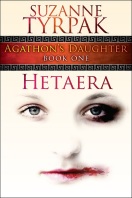
From Dana Taylor: I was so impressed with the way Suzanne Tyrpak made ancient Greece come alive in HETAERA, I asked her to talk about what inspires her to delve into historical backgrounds. Turns out she’s another seeker of Feminine Empowerment.
Congratulations to Alex Fatcow and Sue Vanderpool on winning a copy of one of Suzanne books. Interesting discussion!
Drama Queens are often high maintenance so, in these days of economy, they’ve fallen out of favor, but as a writer of historical suspense, I adore these high-strung ladies. Their dramatic antics bring history to life.
In school, history was one of my least favorite subjects. Who cared about wars and politics, the death of kings, boring dates and facts? For me, opening a history book guaranteed a nap.
My interest in history developed from my love of theater and my desire to be an actor. Plays brought the past to life: dialogue, emotions, scenes filled with intrigue and drama. I threw myself into my characters. Wanting to know what they ate, what they wore, how they spent an average day—I did research on the times in which they lived. To my dismay, I found very little about day-to-day life in history books and close to nothing written about the roles of women. Even queens got little mention in comparison to kings, warriors, and other men. Hoping to understand the world of the characters I played, I spent time in museums studying jewelry, fragments of pots, and other household goods. I found taking on the roles of women in plays granted me a deeper insight into history than wading through tomes written by historians.
After reading and performing the plays of Shakespeare, I became interested in the origins of theater. I stumbled on the Greeks. As an aspiring drama queen, I felt at home with murderous Medea, revengeful Electra, and two-timing Clytemnestra—the fabulous, strong (and often insane) women who populate ancient Greek drama.
My latest book, Hetaera—suspense in ancient Athens, part one of the Agathon’s Daughter trilogy, is the result of my long-time interest in the Greeks. I love bringing ancient women to life. Through the eyes of women history is revealed to us in a way often lacking in the history books. I want to take my readers on a journey, steep them in another time, allowing them to taste the food, smell the air, experience how it might feel to live in another time. Of course, because I love a fast-paced story, I add a fair amount of intrigue, romance, and murder into the mix.
Although I just released HETAERA, I began writing the book about eight years ago. I got side-tracked from that book while visiting Italy. I fell in love with Rome and the result was my debut novel, Vestal Virgin—suspense in ancient Rome. A travel book I read contained a short blurb about vestal virgins; it mentioned they were sworn to thirty years of chastity and, if that vow were broken, they would be entombed alive.
That got me going! Plus, on a tour of the Coliseum, a guide pointed out the seats designated to the vestal virgins—the six priestess of Vesta were educated, and therefore powerful, at a time when most women weren’t even taught to read. Vestals were wealthy, paid a stipend, and, unlike other Roman women, they could own property. When I began my research, very little had been written about them—that gave me a lot of leeway. With the reopening of their temple inRome last year curiosity about these amazing priestesses continues to accelerate.
Through my historical suspense novels, I hope, not only to entertain, but to give voice to women who have been silenced through the passing of time. These women, these drama queens, have so much to share with us about what it means to be human. How can we, as a society, hope to understand ourselves if half of our story is missing?
Ask Suzanne a question in the comments to be eligible for a FREE copy of one of her books!


These books sound so interesting! I had a question about the Vestal virgins. Were these women chosen to be Vestal virgins or was it a volunteer type of situation? And in your book, was there anyone who broke her vow and who really was entombed alive? Thanks so much!
If the vestal virgins were entombed alive for breaking their vow of celibacy – what happened to the men they partnered with?
Hi Chavis. There were only six Vestal Virgins. When a place opened, girls as young as seven were selected from the leading families of Rome to be entered into a lottery. The nomination was considered a great honor. Vestals were wealthy and powerful.
I don’t want to give away my plot, but the idea of a Vestal Virgin breaking her vow of chastity sparked the idea for my story.
Sue, I haven’t read documentation regarding punishment being meted out to men for defiling a Vestal Virgin, though to do so was clearly unlawful and sacrilegious. I imagine the deed carried disgrace and might lead to banishment from Rome. However, scare-tactics and threat of punishment failed to act as a deterrent to the Emperor Nero.
Drama queens, I guess! Very interesting article. Do you find them as interesting as modern day drama queens?
I love drama queens from all ages, Mary–but in real time, I prefer them at a distance! Though I’d rather not work with drama queens, I appreciate the conflict and entertainment they provide as characters. I work for an airline so I get to see quite a few drama queens–sometimes the stress of travel brings out the drama queen in the mildest of personalities.
Thanks for the question!
I can be a drama queen sometimes so this article is very familiar for me. I know it was a big privilege to be a Vestal Virgin in ancient Rome. For sure to serve for 30 years is a heavy duty but that girls were independent and were treated with the entire honor. I also know that for breaking their duty of innocence they were buried alive. How do you think could Vestal Vergins be compared to nuns.
I can see why you were intrigued by the vestal virgins. Did the girls have a choice? Although I’m sure a 7 year old girl didn’t understand what she was giving up. Celibate? What’s that?
So who do you think is history’s biggest drama queen?
Suzanne–I was so impressed with the way you made the details of daily living in ancient Greece come alive. Also, you captured a male-dominated society very well. It seemed to me your writing was also a social commentary on today’s culture. True, or was I reading too much into it? Dana Taylor
Hi Alex. Interesting question–one I’ve often thought about. I find a lot of similarities between the Vestal and nuns: cloistered lives, high literacy, not to mention celibacy. I don’t think it’s coincidence that so many traditions of Vestal Virgins were transferred to women priests within the Christian church.
Lisa, I don’t think the girls or the parents had much choice. To refuse the post would have been an insult to the state of Rome. After thirty years of service, the Vestal Virgins were free to leave the order, but few did. The prospect of returning home to live under the thumb of an elderly father or a brother didn’t not appeal to many of these relatively independent (and wealthy) women. Vestal Virgins had property rights, education, and power unknown to most Roman women.
Dana, it’s probably impossible for me to write without the filter of modern society. I often think about how much society has changed over the past hundred years. Hard to imagine women without the vote in the U.S. isn’t it? Even now, there are people who would like to squelch our rights. Did you realized pharaonic circumcision of women was only banned in the US about 13 years ago? That kind of mutilation is rampant throughout the middle east. Unfortunately, there are many places in this world where women still have little choice and their worth is often measured by sexuality and child-bearing.
Forgot to mention my fave drama queen of ancient times. Of course, Cleopatra comes to mind. But, if goddesses count, I love Sekhmet–the Egyptian lion-headed goddess. Her name is often translated as “powerful one.” The protector of women and children, she’s associated with dance, joy, sexuality–and she’s known to have an outrageous temper!
I have both your books, Suzanne, so I’m not eligible for the drawing.
Just wanted to say that I started Hetaera and had to put it down because it was too good to read in little pieces. As soon as I send my next series off to the editor and I have some breathing room, I’m giving myself a reading vacation. Hetaera is at the top of my TBR list.
Enjoyed the article and your journey.
Thank you, Margaret! You made my day. 🙂